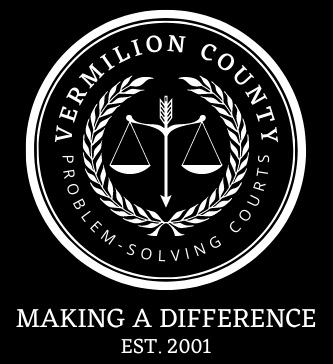Problem-Solving Courts Information
Mission Statement
The mission of the Vermilion County Problem-Solving Courts is to develop substance-free, productive citizens and break the cycle of criminal recidivism. This is accomplished by assessing and directing individuals with substance abuse addictions and/or mental health issues into judicially-supervised treatment.
Facts about Problem-Solving Courts
Vermilion County offers three (3) separate Problem-Solving Courts; Drug Court, Mental Health Court, and Veteran’s Court. These Courts are specialty courts that manage cases through comprehensive supervision, drug testing, treatment, and sanctions/incentives. Incarceration is an appropriate resolution for some defendants; but for many, society is better served by addressing the underlying causes of a defendant’s addiction and/or mental health issues. Problem-Solving Courts significantly reduce drug use, recidivism, and are much more cost-effective than traditional criminal justice methods. There are more than 3,800 Problem-Solving Courts across the United States and in each of the 50 states. Addiction to drugs is difficult to overcome in the best of circumstances. Individuals sentenced to Problem-Solving Courts work harder than they have ever worked in their lives. A defendant’s success requires tremendous dedication from the professional staff, the clients, and their families to make the transition from addiction to recovery. All Problem-Solving Courts are voluntary programs.
The following agencies are represented on the Drug Court Team: Judge, State’s Attorney, Public Defender, Court Services, Rosecrance, Crosspoint Human Services, the Judiciary, and the Sheriff’s Department.
The following agencies are represented on the Mental Health Court Team: Judge, State’s Attorney, Public Defender, Court Services, Rosecrance, Crosspoint Human Services, the Judiciary, and the Sheriff’s Department.
The following agencies are represented on the Veteran’s Court Team: Judge, State’s Attorney, Public Defender, Court Services, Veteran’s Affairs Illiana Health Care System, the Judiciary, and the Sheriff’s Department.
Local Problem-Solving Courts Impact
Since Problem-Solving Courts not only address addiction, but also lifestyle, businesses, and citizens are no longer victimized to support the participants’ addictions. Because of Problem-Solving Courts, Vermilion County is a safer place to live and work. Problem-Solving Courts are cost-effective for our community. The cost to taxpayers for incarcerating a defendant is approximately $24,000 per year. The cost of treatment for a Problem-Solving Courts participant is approximately $5,000 per year. Therefore, an individual’s participation in the program saves the community $19,000 per year. When all totaled, the citizens of Vermilion County and the State of Illinois have saved hundreds of thousands of dollars because of the success of Problem-Solving Courts.
The Application Process
The Problem-Solving Courts application process begins when the Defense Attorney/Public Defender meets with the defendant, explains the Problem-Solving Court expectations and the defendant agrees to pursue entry into the Program. The defendant, through his attorney, must send a “Problem-Solving Court Application” to the Problem-Solving Court Coordinator. A Probation Officer will screen the applicant at the Vermilion County Jail, if the applicant remains in custody. If the applicant is not in custody, the Probation Officer will set up an interview date with the applicant at the Probation Department. The initial screen includes collecting background information, history of previous drug and/or alcohol use, and any mental and/or physical illnesses. The Officer(s) will have the applicant sign releases of information. After the screening, if the applicant meets criteria, he or she will be interviewed for a Substance Abuse Assessment or Mental Health Assessment by a licensed treatment provider. The purpose of the assessment is to diagnose and identify the level of treatment, make treatment recommendations, and create a treatment plan. The assessment will also highlight other areas for which the applicant should receive treatment (e.g. mental illness, trauma, PTSD, etc.). The Probation Officer then types a report with all information collected on the defendant and the team makes the decision on whether or not the defendant has met criteria. Then, the final determination is made by the presiding Judge on whether or not the defendant is approved into the program. Next, said Probation Officer will e-file an acceptance or denial form which will be served to all attorneys involved. Prior to entry into the Program, the Defense Attorney will review with the applicant the “Consent to Participate in Drug Court/Mental Health Court/Veteran’s Court”, and the “Addendum for Drug Court/Mental Health Court/Veteran’s Court”. Once all questions have been answered and both documents have been read and signed, the Judge will undertake appropriate plea proceedings, consistent with the law, Supreme Court Rule 402, and PSC Standard 7.2(e). The applicant will be advised of the treatment recommendations, status of placement, and the projected time for their name to come up on a wait list.
- Problem-Solving Courts Eligibility Criteria
- Drug Court Forms & Handbook
- Mental Health Court Forms & Handbook
- Veteran’s Court Forms & Handbook
How You Can Help Problem-Solving Courts
Vermilion County Problem-Solving Courts depend on support from the local community. You can help by:
- Making monetary donations to aid participants receive necessary medical, dental, and other services.
- Donating merchandise or gift cards for incentives. Research has shown that a system of incentives and sanctions is most effective. Incentives have been shown to decrease recidivism by up to 65%.
- Employing Problem-Solving Court participants and graduates.
- Asking your elected officials to support Problem-Solving Courts.
Please consider helping Vermilion County Problem-Solving Courts fulfill its mission to foster responsible citizenship. You can donate in person or send a check made payable to the Vermilion County Drug Court Fund.
Mail to:
Vermilion County Probation
ATTN: Cayley Martin
7 N Vermilion, 5th Floor
Danville, IL 61832
All donations are tax deductible. A receipt will be issued in the donor’s name for tax records.
More Information on Problem-Solving Courts:
You can learn more about Problem-Solving Courts at:
- https://ndcrc.org/
- https://www.nadcp.org/
- https://www.illinoiscourts.gov/courts/additional-resources/problem-solving-courts/
For further information, please contact the Program Coordinator, Cayley Martin, at cmartin@vercounty.org or 217-554-7915.
Suicide Hotline
- 800-273-TALK (800-273-8255) National Suicide Prevention Hotline
- 988 – Three-digit number will connect to the National Suicide Prevention Hotline
Self-Help/Support Groups
- Alcoholics Anonymous https://www.aa.org/
- Narcotics Anonymous https://na.org/
- Step Recovery https://www.facebook.com/STEPRecoveryCenter/
- In the Rooms – online meetings https://www.intherooms.com/home/
